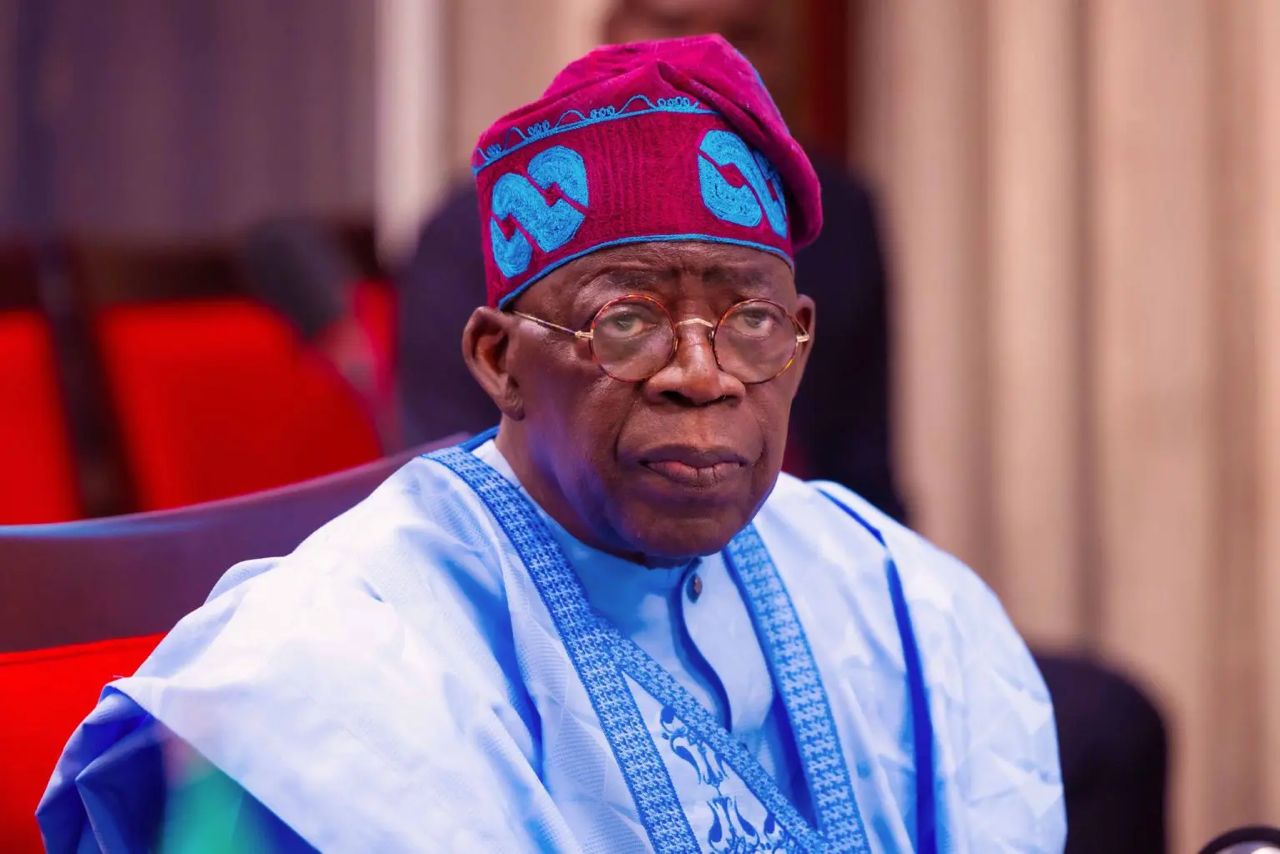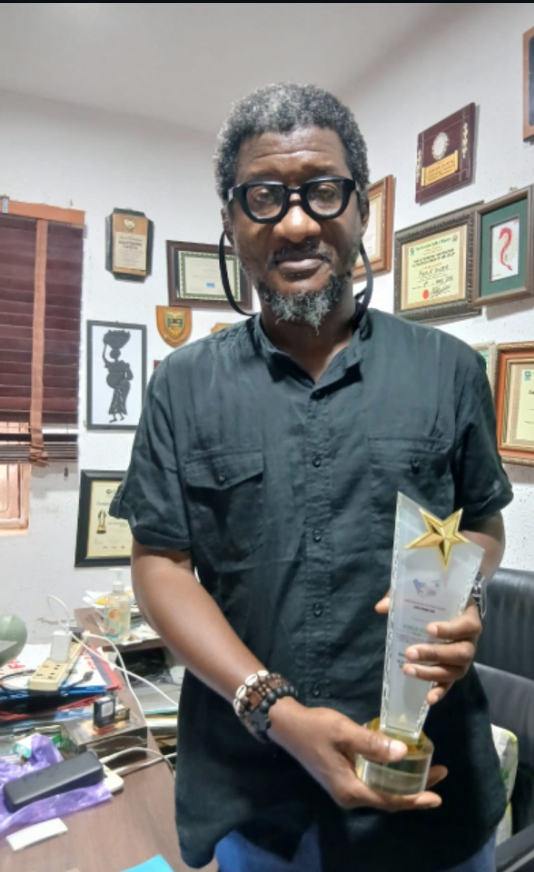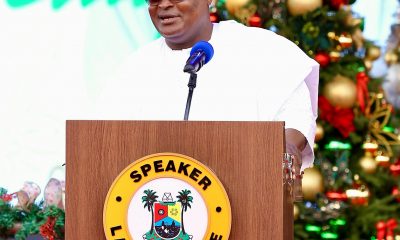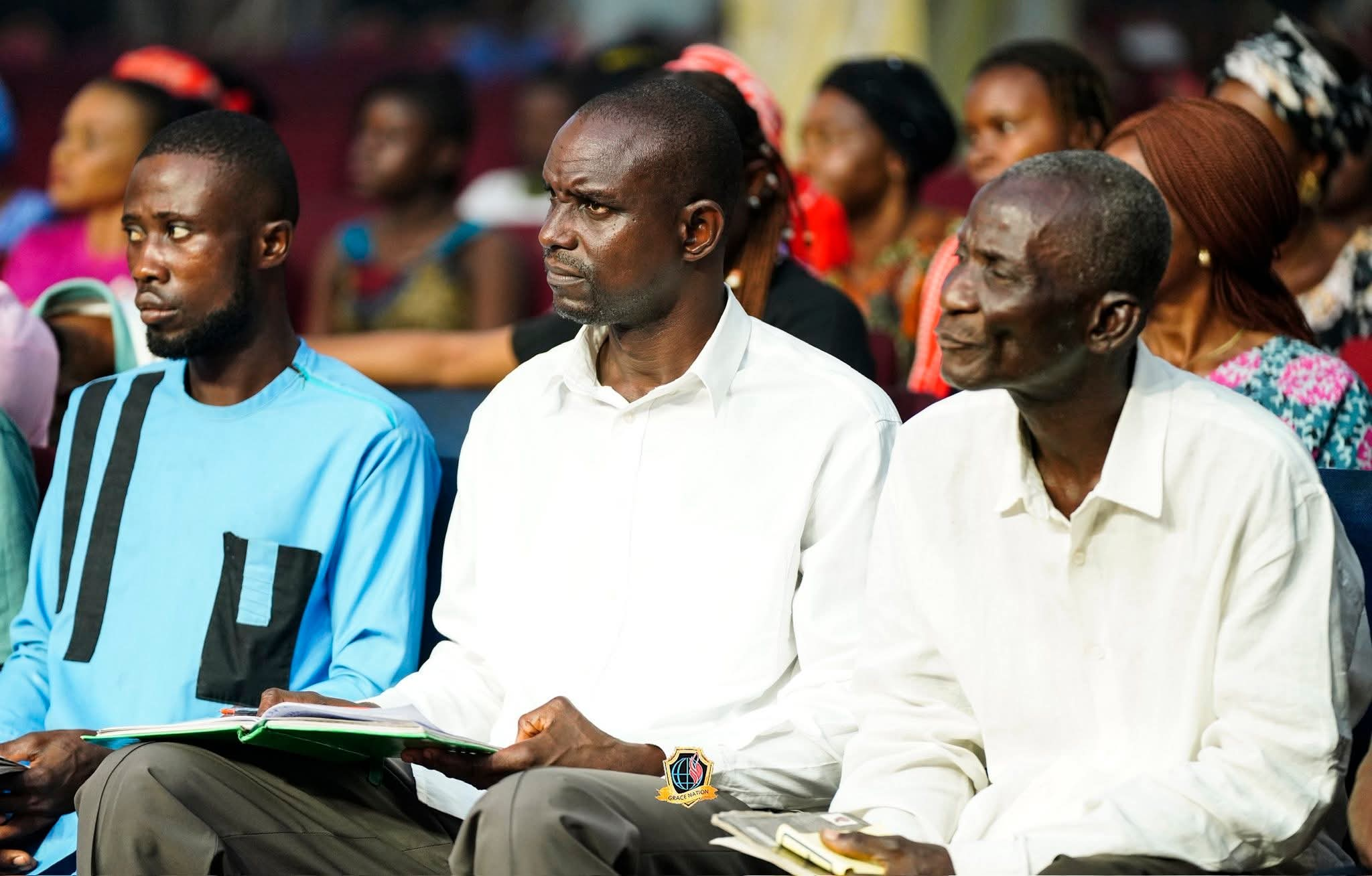celebrity radar - gossips
Dare Adekanmbi: Understanding Tinubu’s tax bills of reliefs for Nigerians, businesses

Dare Adekanmbi: Understanding Tinubu’s tax bills of reliefs for Nigerians, businesses
The transmission of four bills that aim to overhaul Nigeria’s tax system to the National Assembly two weeks ago by President Bola Tinubu has sparked debates in the polity about the purpose of the bills. Some have expressed fears that the bills may encapsulate proposals calling for a raise in tax rates in a way that will further burden the citizens. Some Nigerians have received the news with mixed feelings, while others have chosen to wait for details before commenting on the development.
There is no basis to entertain any fear about these bills. If anything, Nigerians are going to commend President Tinubu for focusing on laying a solid foundation that will ensure fiscal stability of the country. When Nigerians get to know the details of the in the documents, they will know that the president is actually working to bring reliefs to them and their businesses.
The four executive bills seek to tidy up the fiscal policy and legislation environment in the country. They are: Nigeria Tax Bill, Nigeria Tax Administration Bill, Nigeria Revenue Service (Establishment) Bill, and Joint Revenue Board (Establishment) Bill. These bills seek to translate the recommendations by the Presidential Committee on Fiscal Policy and Tax Reforms, chaired by Taiwo Oyedele, into implementable legislative framework for the benefits of Nigerians.
It is common knowledge that one factor which has continued to impede efficiency in Nigeria’s tax system and has negatively impacted revenue is multiplicity of taxes. President Tinubu, in his inauguration speech, had pledged to address the issue of multiple taxation and remove all hurdles against investment in the country. Multiplicity of taxes is one of the issues that the Nigeria Tax Bill seeks to end. This will certainly bring reliefs to corporate Nigeria. Imposition of tax by more than one agency or level of government, without a shadow of doubt, constitutes a chokehold on businesses, especially micro and small businesses as well as individuals.
How will this bill address multiplicity of taxes? In Nigeria today, laws dealing with various aspects of taxation are scattered in different legislations. Some of these laws are: Companies Income Tax Act, Personal Income Tax Act, Capital Gains Tax Act, Value-Added Tax Act, Stamp Duties Act, Petroleum Profits Act, Tertiary Education Fund Act, Petroleum Industry Act and so on. In addition to the tax-specific laws, there are plethora of tax provisions in non-tax laws such as the NLNG Act, Tertiary Education Trust Fund Act, NASENI Act, Lottery Act, Companies and Allied Matters Act, etc. The list is seemingly endless.
In enforcing these disparate tax provisions, unintended multiple taxation occurs and this is one of the things that the bill seeks to address. The Nigeria Tax Bill aims to codify of all taxing provisions into one single document to be known as the Nigeria Tax Act when passed into law. In the bill, chapters are devoted to the various tax types in a simplified format. The proposed tax law is also written in a simple language that anyone with basic literary education can read and understand. The complexity of the extant law, for instance, is such that it will be pretty difficult for a Professor of Mathematics to compute his personal income tax on his own because of all the inter-twinning provisions that will befuddle him as to what income is taxable or what deduction is allowable. All these complications and complexities have been removed in the new proposals.
In the proposed law, companies doing businesses within the country have been re-classified into two: small and large. This is done in accordance with the companies’ respective turnover thresholds. A company will be deemed small if its turnover is N50m or less in a year. Under the extant law, any company which records a turnover of N25m or less is not required to pay Companies Income Tax (CIT). In the new tax bill, companies with yearly turnover that is up to N50m will not pay CIT. As regards large companies, that is, those whose turnover thresholds are above N50m, there is a proposal in the bill to give some relief to them. The objective of this succour for such companies is in line with President Tinubu’s avowed commitment to protect small businesses and eliminate inhibitions that negatively impact entrepreneurship in the country.
Perhaps the game-changer among the several pleasant provisions of this document is what the bill seeks to do with VAT. It is an eloquently testimony to the fact that President Tinubu has listened and harkened to the complaints by Nigerians, particularly the ordinary Nigerians who are bearing the substantial brunt of the initial pain of the government’s economic reformation policies. In the proposed law, VAT will not be charged on all items that have direct existential impact on the common people. Items such as food, medicals, education, transport business and agriculture are not chargeable to VAT. For instance, tuition fee or rent paid by proprietors or purchases made by school owners for the purpose of the business of educating Nigerians will be free from VAT. It is the same for owners of hospitals, those in agricbusiness as well as those who buy vehicles for transportation. These are the areas where the lives of the common people will be significantly positively affected, especially in view of the temporary pain of the ongoing reforms.
In addition, certain input VAT which hitherto is not possible to claim under the current law can now be claimed. Another relief the president has put in the bill is that for VAT refunds will be made within 30 days upon completion of paper work by the such companies or entities. Already VAT is not being charged on diesel and petrol. The president had in July this year directed the suspension of duties, tariffs and taxes on importation of food commodities as part of measures to arrest the rising cost of living.
It may interest many to know that VAT rate of 7.5% currently being charged in Nigeria is the lowest on the continent and one of the lowest in the world. Madagascar and Morocco charged 20% VAT in 2022, while it is 19.25% in Cameroon. Many countries of the world, recognising the importance of tax revenue in providing public services, have this year reviewed their VAT upwards with one of the most striking examples being Saudi Arabia which upped its rate from 5% to 15% in July.
Further to the Nigeria Tax Bill, the table of tax rates for individuals has been restructured in a way that brings huge respite to low-income earners. It is worth mentioning that the Federal Inland Revenue Service (FIRS) does not collect taxes from individuals. It is within the jurisdiction of states’ revenue authorities to collect such income tax from individuals. The only set of individuals who pay personal income tax to FIRS are members of the Armed Forces, members of the diplomatic corps and foreigners earning income in Nigeria. In the new bill, individuals whose annual income is N800, 000 after the deductions of pension and deductible items will not be required to pay personal income tax (PAYEE). However, the elite who earn fat annually will pay more. This is in line with the global principle of progressive taxation which takes more tax from the high earners and a little lower tax from middle earners, while low income individuals pay very little. The pledge of Mr President is that his administration’s fiscal policy will tax prosperity and not poverty.
The second bill, the Nigeria Tax Administration Bill, basically seeks to consolidate administrative provisions for all taxes. This bill harmonises all tax administration issues such as registration, filing, payment, dispute resolution, etc for all tax-types and revenue authorities. It also clearly delineates the roles and objectives of all tax authorities in the country as well as their relevant jurisdictions. The aim of this bill is to promote the ease of tax administration, lessen tax compliance burden on the citizens and improve the ease of doing business in the country.
As for the proposed Joint Revenue Board (Establishment) Bill, this is seeking to replace the Joint Tax Board (JTB) which has been wobbly since its establishment because it was built on quicksand. The proposed replacement not only addresses the glaring shortcomings in JTB, but also retains the joint control of the body by the federal and state governments. It also seeks the creation of the office of Tax Ombudsto resolve all complaints that may arise from the operations of JRB.
Today, we cannot run away from the cryptocurrency ecosystem because it is the in-thing. But as it stands in Nigeria today, there is no law that regulates cryptocurrency operations. One key highlight of the Nigeria Tax Bill is that it seeks a legislation to regulate the digital currency market said to be worth $1trillion globally. The bill, when passed into law, will arrest the revenue the country has haemorrhaged in the sector. It will be recalled that some executives of one of the biggest cryptocurrency platforms, Binance, are in court for non-payment of taxes among other offences.
The Nigeria Revenue Service (Establishment) Bill is primarily proposing a change of name for the Federal Inland Revenue Service (FIRS) to the Nigeria Revenue Service. This bill is one which seeks to correct the error of 2007 when Nigeria’s apex tax authority, FIRS, became autonomous as an operational arm of the Federal Board of Inland Revenue (FBIR). The mandate of FIRS is to administer tax laws to assess, collect and account for revenue accruable to the federation and not the Federal Government. Especially when we consider the current sharing formula on VAT revenue, only 15% goes to the Federal Government. The remaining 85% is shared between the states and the local government areas.
Today, tax revenue from FIRS is the main reason the 36 states and the local government councils smile to the banks monthly during their Federation Account Allocation Committee (FAAC) meeting. A total of N17.8trillion accrued to the Federation Account between January and July this year. FIRS tax revenue alone contributed N11.7trillion, representing 65.8 percent of the total money disbursed to the federal, state and local government councils to meet their needs.
Giving such a critical agency an appellation which suggests it is collecting tax solely for Federal Government is improper and must be corrected. Another error in the current name is contained in the word ‘Inland’ which restricts the agency to the collection of taxes within the interior territory of the country. Nigeria has huge revenue to collect from offshore transactions and only a repeal of FIRS (Establishment) Act 2007 to pave the way for the Nigeria Revenue Service (Establishment) Act can make that happen. Those suggesting that the proposed name change will translate to other revenue agencies being subsumed or merged with NRS need to get copies of the bill to clear their doubt.
The general principle of the four tax bills is not just to modernise the tax system in the country, but also to ensure that relief is created for ordinary Nigerians and businesses. And so, for insulating the poor from VAT payment through exemptions of good and services that directly impact their lives, for making VAT neutral for businesses through enabling deduction of input tax from out VAT, President Tinubu has demonstrated fidelity to his commitment that government policies must allow the poor to breathe and not suffocate. Tinubu deserves to be applauded as a leader who listens to the yearnings of the citizens.
Dare Adekanmbi is the Special Adviser on Media to the FIRS chairman.
celebrity radar - gossips
Another Feather for Nollywood Icon Fidelis Duker

**Another Feather for Nollywood Icon Fidelis Duker
*Lagos, Nigeria* — In a remarkable celebration of artistic achievement, renowned Nollywood figure Fidelis Duker received yet another prestigious accolade last weekend, solidifying his role as a key player in the growth of the Nigerian and African film industries. The award was presented in a ceremony held at Duker’s Lagos office by esteemed film and theatre director, Mr. Alex Eyengho, founder of the Warri International Film Festival, alongside Marketing and Strategy Director, Mrs. Matel Eyengho.
The recent recognition builds upon Duker’s previous achievement at last year’s ECOFEST in Dakar, where he was honored with a Lifetime Achievement Award. This latest accolade is a testament to his unwavering dedication and substantial contributions to the cinematic landscape.
“I am truly humbled by this recognition,” Duker expressed during the event. In his speech, Alex Eyengho lauded Duker’s pioneering efforts in establishing significant film festivals in Nigeria, particularly the Abuja International Film Festival, which has played a vital role in promoting local talent and storytelling.
Eyengho emphasized, “Fidelis has not only paved the way for emerging filmmakers but has also helped elevate Nigerian cinema on the global stage. His creative vision and commitment inspire all of us in the industry.”
As Duker reflects on this honor, he acknowledges the importance of teamwork and collaboration in achieving success. “This acknowledgment reaffirms to my team and me that our work is being observed, and it motivates us to continue contributing to the development of our sector,” he stated.
With numerous projects on the horizon, Duker remains a relentless advocate for the growth and recognition of African cinema. His latest recognition is yet another testament to the vibrant and evolving landscape of Nollywood, as industry leaders like him continue to inspire future generations.
As the film industry anticipates the next phase of development, Duker’s continued influence signals a promising future for filmmakers in Nigeria and across the continent.
celebrity radar - gossips
E‑Money’s Grand Gesture: A Closer Look at the SUV Gift to Chinedu “Aki” Ikedieze

E‑Money’s Grand Gesture: A Closer Look at the SUV Gift to Chinedu “Aki” Ikedieze
By George Omagbemi Sylvester | Published by SaharaWeeklyNG
“Public Generosity, Celebrity Loyalty and the Symbolism of Wealth in Nigeria’s Entertainment Elite.”
On Tuesday, February 17, 2026, Nigerian billionaire and entrepreneur Emeka Okonkwo, widely known as E‑Money, once again captured national attention with a lavish and highly publicised act of generosity, gifting a brand‑new 2024/2025 Ford SUV to veteran Nollywood actor Chinedu Ikedieze, affectionately called Aki, during his high‑profile birthday celebration.
The event, held in Lagos amidst a constellation of entertainers, business figures and socialites, was itself part of an annual tradition in which E‑Money marks his birthday (on February 18) with large‑scale giveaways and spectacular shows of material philanthropy. This year, he announced the gift of over 30 cars to friends, staff and family, a gesture that quickly went viral as videos and images circulated across social media platforms.
In the case of Ikedieze, E‑Money’s gift appeared to be deeply personal. During the festivities, E‑Money stood beside his elder brother, Grammy‑nominated musician KCee and recounted how Ikedieze stood by him at his 2007 wedding. The billionaire explained that the SUV was a “token of appreciation” for the enduring support the actor had shown over the years which is a narrative that blends friendship with public celebration.
Ikedieze, a Nollywood staple with a career spanning more than two decades and over 150 film credits, including the iconic Aki na Ukwa franchise, visibly reacted with humble surprise as he received the vehicle, bowing his head in respect and gratitude. The actor later shared the moment on his Instagram account with a caption celebrating the gift, further fuelling online engagement around the event.
Beyond the spectacle, this incident underscores evolving dynamics in Nigerian celebrity culture and the intersection of wealth, influence and reciprocity. Sociologist Dr. Chinedum Uche of the University of Lagos, speaking on the broader implications of such high‑profile gifts, notes: “Philanthropy that is highly publicised can reinforce social bonds, but it also reflects a culture where generosity is intertwined with reputation economy; where giving becomes as much a social signal as it is an act of kindness.” The quote highlights how public acts of wealth transfer among elites serve layered social functions that extend beyond pure altruism.
Critics of such displays argue that ostentatious giveaways, particularly in a country with stark economic disparities, risk amplifying social envy and exacerbating perceptions of inequality. Economist Dr. Ifunanya Nwosu from the Lagos Business School observes: “In societies marked by economic stratification, celebrity largesse may inspire admiration, but it can also inadvertently highlight structural inequities; prompting questions about systemic investment in public welfare versus individual generosity.”
Still, supporters maintain that E‑Money’s annual tradition (which has in past years included cash gifts to his brother KCee, comedians and even domestic staff) reflects genuine gratitude and a commitment to uplifting his immediate circle, albeit within the private sphere.
For Ikedieze, the SUV stands both as a heartfelt gesture from a longtime friend and a public affirmation of their enduring relationship. As the video of the moment continues to circulate, the broader narrative has ignited discussions about the role of private wealth in public life, celebrity culture and how acts of giving are interpreted in contemporary Nigerian society.
In a landscape where influence and generosity often play out in equal measure on public stages, E‑Money’s gift to Aki is more than a headline, it is a flashpoint in ongoing debates about wealth, friendship and visibility in Nigeria’s entertainment and entrepreneurial ecosystem.
celebrity radar - gossips
Spiritual Reality: Wicked People Are Possessed by Wicked Spirits — Dr. Christian Okafor

Spiritual Reality: Wicked People Are
Possessed by Wicked Spirits — Dr. Christian Okafor
…..“You don’t need to offend them before they attack you.”
…..“Your only true help comes from God.”
Demons are strategic and calculating. They detect threats quickly and position themselves to resist any power that may expose or overpower them.
According to the Generational Prophet and Senior Pastor of Grace Nation Global, Christian Okafor, spiritual intelligence operates both in light and in darkness—and believers must understand this reality.
Dr. Okafor delivered this message on Thursday, February 19, 2026, during the midweek Prophetic, Healing, Deliverance and Solutions Service (PHDS) held at the international headquarters of Grace Nation Worldwide in Ojodu Berger, Lagos, Nigeria.
The Operations of Demons
Teaching on the subject “Spiritual Reality” with the subtitle “Operations of Demons,” the Man of God explained that when demons possess individuals, their behavior changes. Such people may attack, bully, or resist those sent by God to help them, unknowingly rejecting divine assistance and prolonging their struggles.
“You don’t need to offend a demon before it attacks you,” he said. “What you carry is enough to provoke opposition. The greater your potential, the greater the battle.”
Dr. Okafor noted that many believers misinterpret battles as signs that God has abandoned them. However, he explained that some battles are permitted for growth, training, and divine glorification.
According to him, God may allow certain confrontations so that believers understand spiritual warfare and emerge stronger.
“Some battles are necessary,” he emphasized. “They push you into your turning point.”
He further stated that God does not respond to lies, blackmail, or bullying. He responds to His Word. Therefore, opposition is not proof of God’s absence, but often evidence of destiny at work.
The Weapon Against Demonic Attacks
Addressing solutions, Dr. Okafor described prayer as the strongest weapon against satanic operations.
“Prayer is the license that invites God into your battles,” he declared. “God does not intrude—He responds to invitation.”
According to the Apostle of Altars, understanding the principles and discipline of prayer enables believers to receive divine strategies for overcoming demonic resistance. Without prayer, he warned, spiritual help cannot be activated.
“You cannot receive help without God,” he concluded. “And you cannot engage God without prayer.”
Manifestations at the Service
The midweek gathering was marked by a strong move of the Spirit, with testimonies of deliverance, miracles, restoration, and solutions to various challenges presented before God. Several individuals reportedly committed their lives to Christ during the service.
-

 celebrity radar - gossips6 months ago
celebrity radar - gossips6 months agoWhy Babangida’s Hilltop Home Became Nigeria’s Political “Mecca”
-

 society6 months ago
society6 months agoPower is a Loan, Not a Possession: The Sacred Duty of Planting People
-

 society5 months ago
society5 months agoReligion: Africa’s Oldest Weapon of Enslavement and the Forgotten Truth
-

 news6 months ago
news6 months agoTHE APPOINTMENT OF WASIU AYINDE BY THE FEDERAL GOVERNMENT AS AN AMBASSADOR SOUNDS EMBARRASSING










